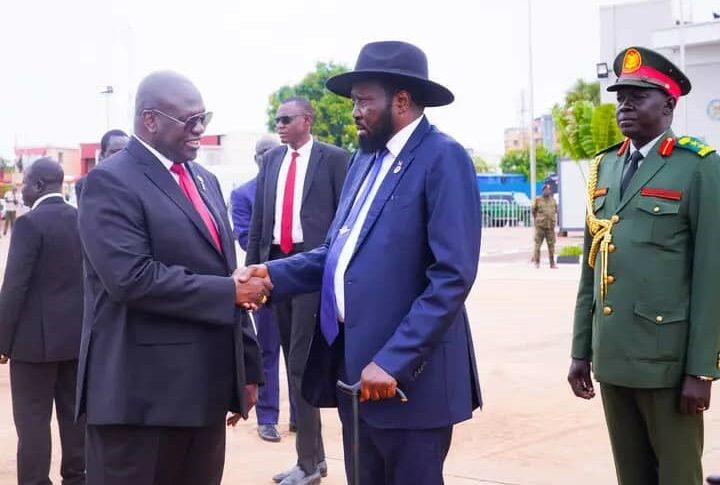Elections
South Sudan’s Kiir rejects another extension, vows readiness for elections
March 19, 2024 (JUBA) – South Sudan President Salva Kiir has rejected another extension of the transitional period, citing the need for citizens to choose their leaders through a popular constitutional process.
Minister of Presidential Affairs, Bangasi Joseph Bakosoro, told peace partners on Tuesday the president and his ruling Sudan People’s Liberation Movement (SPLM) see no alternative to elections.
“The elections should go ahead as scheduled. No more extension of the term of the current transitional government after the expiry of the roadmap, said Bakosoro, an ally of President Salva Kiir from western Equatoria’s third largest tribe in south Sudan, the Azande Kingdom.
He spoke on behave of President Salva Kiir at the opening of a civic and political dialogue on the political transition in Juba on Tuesday. Bakosoro explained to the audience There has been mounting pressure on South Sudan political leaders to decide on the way forward regarding the upcoming general elections.
“You are not with the president and if you were in his shoes, you would understand what he goes through each day”, revealed Bakosoro.
The United Nations said no extension, the Troika said no extension, the European Union said no extension and the IGAD said no extension. Then who are you or me to say there must be an extension again? We don’t want it, he said.
“The only issue is what the way forward is, which is now for you [civil society] to tell us in good faith what the way forward is. So, this is the message I am bringing you,” he added.
The top presidential aide further revealed that the parties to the 2015 revitalized 2018 peace agreement are planning to hold dialogue and discussions to decide on the way forward regarding the upcoming elections, urging the civil society to deliberate and help guide the political leaders on the way forward.
“You please discuss everything exhaustively. The general statement that we are going to elections is good, but what type of elections are we going for? You can also discuss and guide us on this. We don’t need an extension again because you and I are tired of extensions,” said Bakosoro.
The former governor said he would prefer elections be conducted even if it means going for them on a day like today.
“If it was me, we could go for elections today because I don’t fear that I will go home. I will go home to come back again. Some people are afraid to go home. We must go home so that our people can send us back with honour and respect. That is why my real title remains governor because I got it with respect and honour. Please discuss and come up with the way forward as civil society,” he added.
Lam Akol Ajawin, the leader of the opposition National Democratic Movement (NDM), echoed the statement of the minister of presidential affairs, saying the people of South Sudan are fed up with extensions of the transitional government.
“As somebody who has done research, I know the South Sudanese people want elections now, not tomorrow. But at the same time, this may also be a result of the frustration of transition after transition from 2005 up to today. South Sudan has been ruled by transitional governments, that’s why the people would want to eliminate these transitions by all means,” he said.
Ajawin stressed that “dialogue is the only thing that will save South Sudan from quagmire and dilemma around elections.”
The end of the transitional period was scheduled for 2022 but was pushed back to December 2024 due to the lack of progress on many provisions of the 2018 peace agreement that ended a bloody five-year civil war.
While President Kiir, members of his administration, and key allies have called for holding the polls in December 2024, his first deputy and leaders of the main armed opposition, and someone expected to be a lead competitor, prefer a full implementation of the key prerequisite in the agreement. he cites the implementation of the security arrangement, saying concerns for critical conditions would undermine the holding of free, fair, secure, and credible elections
In his letter responding to the peace monitoring body in South Sudan on Monday, First Vice President Riek Machar, his group has taken note of two options to resolve the impasse.
“The Sudan People’s Liberation Movement in Opposition (SPLM-IO) has also taken note of the two (2) options in the reconstituted Joint Monitoring and Evaluation Commission statement namely: 1. agreeing to conduct a consensus-based election and 2. Agreeing to a revision of the roadmap”, partly reads the letter obtained by Sudan Tribune.
He also acknowledges the importance of the meeting of the African Union ad hoc high-level committee on the South Sudan peace process. The African Union Commission designated Algeria, Chad, Nigeria, Rwanda, and South Africa as members of the High-Level Ad Hoc Committee to assist leaders of South Sudan in resolving contentious issues through dialogue, utilizing their skills and relations. South Africa was the chair at the founding.
Machar said dialogue was one of the ways to resolve whether elections would be held after an extended period or explore other ways to reach a consensus on several issues. he did not propose a way forward, preferring to wait for broader and wider consultation with other parties in the peace process.
(ST)

